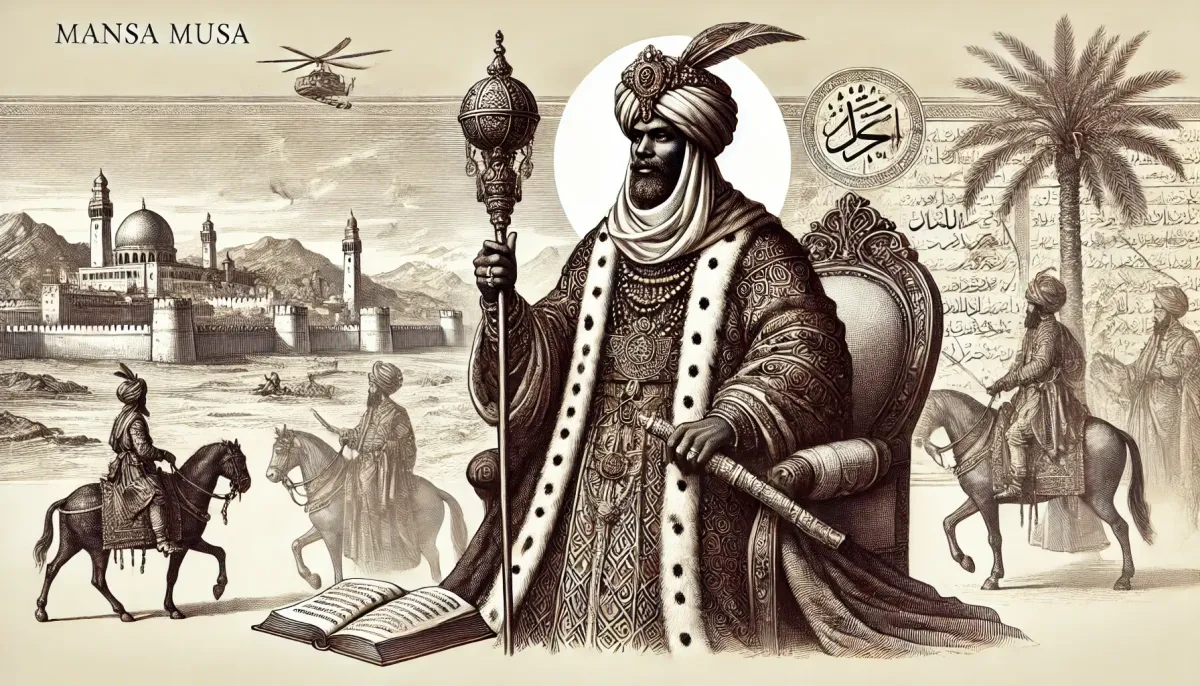When people talk about the wealthiest individuals in history, names like Elon Musk, Jeff Bezos, and Bernard Arnault dominate the conversation. These modern titans of industry have amassed fortunes through technology, luxury goods, and e-commerce. But there was a man, more than 700 years ago, whose wealth far exceeded that of today's billionaires—Mansa Musa I of Mali. Unlike today’s tech-driven wealth, Musa's riches came from controlling the most precious commodity of his time: gold.
Mansa Musa’s wealth was so vast that it is almost impossible to quantify it by modern standards, but his legacy goes far beyond material wealth. He was a ruler who expanded his empire, fostered education, and spread Islam throughout West Africa. This article delves into the fascinating life of Mansa Musa, exploring not just his fortune but also his deeds as a pious Muslim ruler, his contributions to society, and how his wealth stacks up against today's billionaires.
Part 1: The Rise of Mansa Musa and His Empire
The Early Life of Mansa Musa
Mansa Musa was born in 1280 into the ruling family of the Mali Empire. Though not initially destined to rule, fate put him in line for the throne. His predecessor, Abu Bakr II, embarked on an ambitious voyage across the Atlantic, leaving the kingdom in Musa's hands. When Abu Bakr II did not return, Musa was crowned the 10th Mansa (king of kings) of Mali in 1312.
The Mali Empire at the time of Mansa Musa’s ascension was already one of the most powerful kingdoms in Africa, but under his reign, it flourished even further. The empire stretched across West Africa, encompassing modern-day Mali, Senegal, Gambia, Guinea, Niger, and parts of Mauritania.
Mali’s Natural Wealth and the Source of Mansa Musa’s Fortune
The true source of Musa's immense wealth lay beneath the soil of his empire. Mali sat atop some of the richest gold mines in the world. At the time, gold was the most prized commodity globally, and it’s estimated that Mali produced more than half of the world’s gold supply during Musa’s reign. In addition to gold, the empire also controlled key trade routes for salt, another highly valuable commodity, effectively giving Mansa Musa dominion over Africa’s most lucrative trade networks.
While his personal fortune was astronomical, it’s important to recognize that much of Mansa Musa’s wealth was inseparable from the empire's prosperity. He was not just an accumulator of wealth; he was an economic strategist who expanded and controlled trade, multiplying his empire’s riches exponentially.
Part 2: Mansa Musa’s Pilgrimage to Mecca
The Hajj That Shocked the World
Mansa Musa’s wealth became legendary during his famous pilgrimage to Mecca in 1324, a journey that not only demonstrated his piety as a devout Muslim but also exposed the world to the scale of his fortune.
As a Muslim ruler, Musa was deeply committed to fulfilling the five pillars of Islam, one of which is the Hajj (pilgrimage to Mecca). However, Musa's Hajj was unlike any pilgrimage before or since. He embarked on the journey with a caravan reportedly consisting of 60,000 people, including soldiers, slaves, and attendants, along with a vast number of animals—100 camels, each carrying hundreds of pounds of gold.
Musa’s generosity was unparalleled. Along the way, he distributed gold freely to the poor, bought extravagant gifts, and funded the construction of mosques. In Cairo, where he spent three months, he gave away so much gold that it caused a gold price collapse and devalued the currency, leading to years of economic instability in Egypt.
A Pious Muslim and Generous King
Although Musa’s pilgrimage is often remembered for its spectacle of wealth, it’s essential to understand his actions as part of his commitment to Islam. He was known to be a pious and devout Muslim, ensuring that his empire embraced Islamic teachings. His pilgrimage was a reflection of his devotion, but it also served to expand Mali’s reputation in the Islamic world.
Mansa Musa used his wealth for charitable deeds in accordance with Islamic principles. He financed the construction of mosques and religious schools throughout his empire and abroad. One of his most enduring legacies is the Djinguereber Mosque in Timbuktu, which became a major center of Islamic learning. Musa’s reign also saw the expansion of Islamic scholarship, and he brought back scholars, architects, and books from his travels to develop Mali into a hub of education.
Part 3: The Legacy of Mali’s Prosperity
Timbuktu: The Jewel of the Mali Empire
Under Mansa Musa’s rule, Timbuktu became one of the wealthiest cities in the world and a major center for Islamic culture and learning. While it had been a trading post before Musa’s reign, the wealth and resources he funneled into the city transformed it into a beacon of knowledge.
Timbuktu housed universities and libraries where scholars from all over the Islamic world studied. The city’s institutions attracted intellectuals from Africa, the Middle East, and Europe. Mansa Musa’s investment in education ensured that Timbuktu would be remembered as one of the great intellectual centers of the medieval world.
The Impact of Mansa Musa’s Wealth on Global Trade
Mansa Musa’s reign also expanded Mali’s influence in the world of trade. He cultivated connections with North Africa, the Middle East, and Southern Europe, establishing Mali as a central player in trans-Saharan trade routes. The distribution of gold during his Hajj further increased demand for Malian gold and solidified Mali’s position as a wealthy empire.
By the end of his reign, Mali was more than just a wealthy empire—it was a cultural and religious hub that connected Africa with the rest of the Islamic world.
Part 4: Mansa Musa’s Wealth in Modern Terms
How Rich Was Mansa Musa?
While historians cannot determine an exact figure for Mansa Musa’s wealth, estimates suggest that his fortune would be equivalent to $400 billion to $500 billion in today’s terms. This far exceeds the net worth of modern billionaires like Elon Musk or Jeff Bezos, whose fortunes peak around $200 billion.
In essence, Mansa Musa controlled the global supply of gold, giving him a near-monopoly on the world’s most valuable resource at the time. His empire’s production of gold, combined with his control over salt and trade routes, created a flow of wealth that has no direct parallel in modern history.
Comparing Mansa Musa to Modern Billionaires
- Elon Musk: In 2024, Musk’s net worth is estimated at approximately $250 billion, mainly tied to Tesla, SpaceX, and other technology ventures.
- Jeff Bezos: The founder of Amazon, Bezos, at his peak, had a net worth of $200 billion, which fluctuates with the stock market.
- Bernard Arnault: The owner of LVMH, Arnault’s wealth also topped $200 billion, accumulated through luxury goods and fashion.
While today’s billionaires have amassed vast fortunes, their wealth is largely intangible—tied to stock prices and corporate assets. In contrast, Mansa Musa’s wealth was grounded in real, tangible assets: gold, land, and control over trade routes. His fortune was not subject to market fluctuations, making it more stable and absolute than the wealth of today’s richest individuals.
Part 5: The Decline of Mali and Mansa Musa’s Enduring Legacy
The Fall of the Mali Empire
Mansa Musa died in 1337, leaving behind a vast and prosperous empire. However, his successors struggled to maintain the same level of wealth and control. The empire began to fragment due to internal strife and external pressure from neighboring kingdoms.
By the 15th century, the Mali Empire’s power had waned, and it was eventually overtaken by the Songhai Empire. However, Mali’s contributions to Islamic culture, education, and global trade endured long after its political decline.
Mansa Musa’s Legacy
Mansa Musa is remembered not only as the wealthiest man in history but also as a ruler who used his fortune to enrich his people and foster learning. His investment in Timbuktu laid the foundation for centuries of intellectual and cultural flourishing in West Africa. Today, his legacy is a reminder that wealth, when combined with vision and piety, can create lasting change.
Though the Mali Empire no longer exists, the stories of Mansa Musa’s incredible wealth, his devotion to Islam, and his cultural contributions continue to captivate historians, economists, and the general public. His wealth, while extraordinary, was just one aspect of a ruler who used his influence to better his world.


